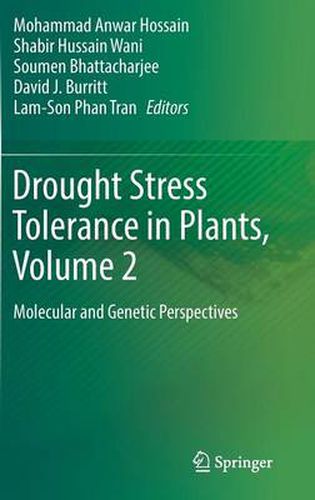Readings Newsletter
Become a Readings Member to make your shopping experience even easier.
Sign in or sign up for free!
You’re not far away from qualifying for FREE standard shipping within Australia
You’ve qualified for FREE standard shipping within Australia
The cart is loading…






This title is printed to order. This book may have been self-published. If so, we cannot guarantee the quality of the content. In the main most books will have gone through the editing process however some may not. We therefore suggest that you be aware of this before ordering this book. If in doubt check either the author or publisher’s details as we are unable to accept any returns unless they are faulty. Please contact us if you have any questions.
Drought is one of the most severe constraints to crop productivity worldwide, and thus it has become a major concern for global food security. Due to an increasing world population, droughts could lead to serious food shortages by 2050. The situation may worsen due to predicated climatic changes that may increase the frequency, duration and severity of droughts. Hence, there is an urgent need to improve our understanding of the complex mechanisms associated with drought tolerance and to develop modern crop varieties that are more resilient to drought. Identification of the genes responsible for drought tolerance in plants will contribute to our understanding of the molecular mechanisms that could enable crop plants to respond to drought. The discovery of novel drought related genes, the analysis of their expression patterns in response to drought, and determination of the functions these genes play in drought adaptation will provide a base to develop effective strategies to enhance the drought tolerance of crop plants. Plant breeding efforts to increase crop yields in dry environments have been slow to date mainly due to our poor understanding of the molecular and genetic mechanisms involved in how plants respond to drought. In addition, when it comes to combining favourable alleles, there are practical obstacles to developing superior high yielding genotypes fit for drought prone environments. Drought Tolerance in Plants, Vol 2: Molecular and Genetic Perspectives combines novel topical findings, regarding the major molecular and genetic events associated with drought tolerance, with contemporary crop improvement approaches. This volume is unique as it makes available for its readers not only extensive reports of existing facts and data, but also practical knowledge and overviews of state-of-the-art technologies, across the biological fields, from plant breeding using classical and molecular genetic information, to the modern omic technologies, that are now being used in drought tolerance research to breed drought-related traits into modern crop varieties. This book is useful for teachers and researchers in the fields of plant breeding, molecular biology and biotechnology.
$9.00 standard shipping within Australia
FREE standard shipping within Australia for orders over $100.00
Express & International shipping calculated at checkout
Stock availability can be subject to change without notice. We recommend calling the shop or contacting our online team to check availability of low stock items. Please see our Shopping Online page for more details.
This title is printed to order. This book may have been self-published. If so, we cannot guarantee the quality of the content. In the main most books will have gone through the editing process however some may not. We therefore suggest that you be aware of this before ordering this book. If in doubt check either the author or publisher’s details as we are unable to accept any returns unless they are faulty. Please contact us if you have any questions.
Drought is one of the most severe constraints to crop productivity worldwide, and thus it has become a major concern for global food security. Due to an increasing world population, droughts could lead to serious food shortages by 2050. The situation may worsen due to predicated climatic changes that may increase the frequency, duration and severity of droughts. Hence, there is an urgent need to improve our understanding of the complex mechanisms associated with drought tolerance and to develop modern crop varieties that are more resilient to drought. Identification of the genes responsible for drought tolerance in plants will contribute to our understanding of the molecular mechanisms that could enable crop plants to respond to drought. The discovery of novel drought related genes, the analysis of their expression patterns in response to drought, and determination of the functions these genes play in drought adaptation will provide a base to develop effective strategies to enhance the drought tolerance of crop plants. Plant breeding efforts to increase crop yields in dry environments have been slow to date mainly due to our poor understanding of the molecular and genetic mechanisms involved in how plants respond to drought. In addition, when it comes to combining favourable alleles, there are practical obstacles to developing superior high yielding genotypes fit for drought prone environments. Drought Tolerance in Plants, Vol 2: Molecular and Genetic Perspectives combines novel topical findings, regarding the major molecular and genetic events associated with drought tolerance, with contemporary crop improvement approaches. This volume is unique as it makes available for its readers not only extensive reports of existing facts and data, but also practical knowledge and overviews of state-of-the-art technologies, across the biological fields, from plant breeding using classical and molecular genetic information, to the modern omic technologies, that are now being used in drought tolerance research to breed drought-related traits into modern crop varieties. This book is useful for teachers and researchers in the fields of plant breeding, molecular biology and biotechnology.